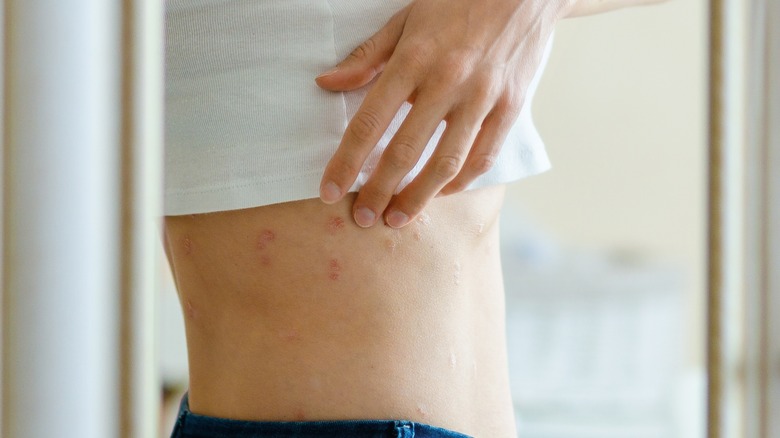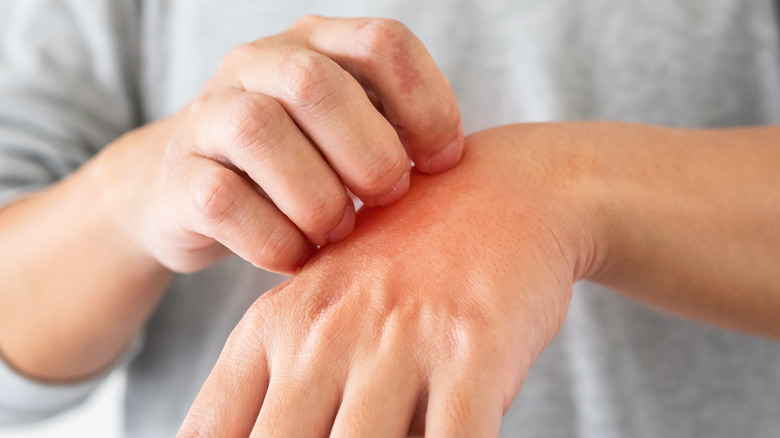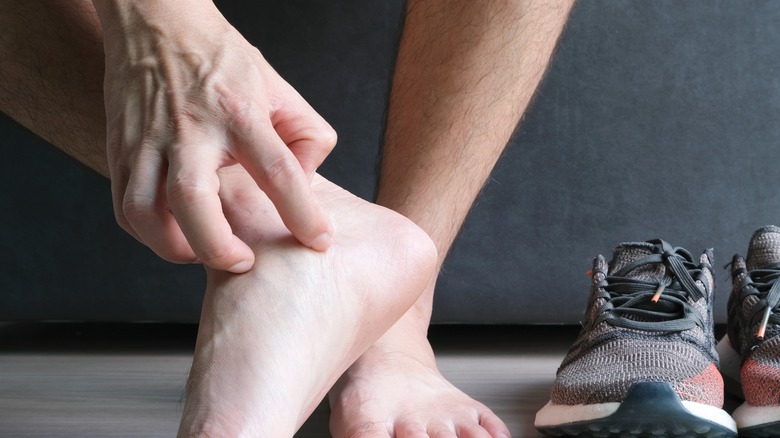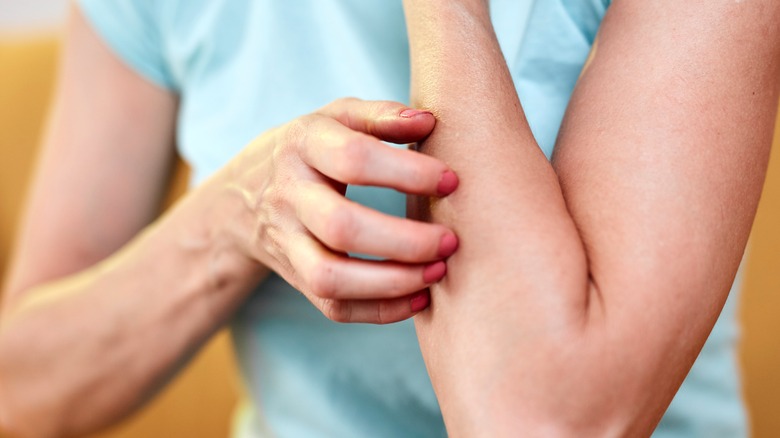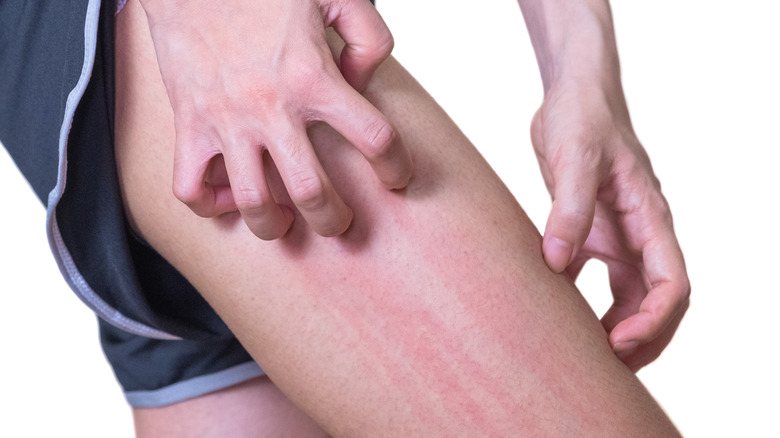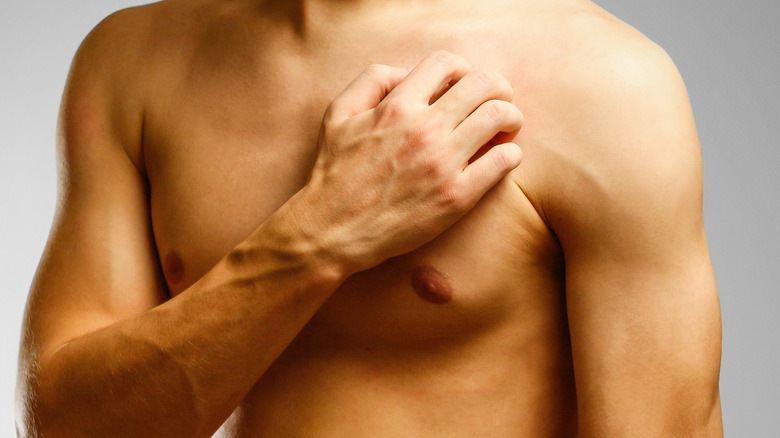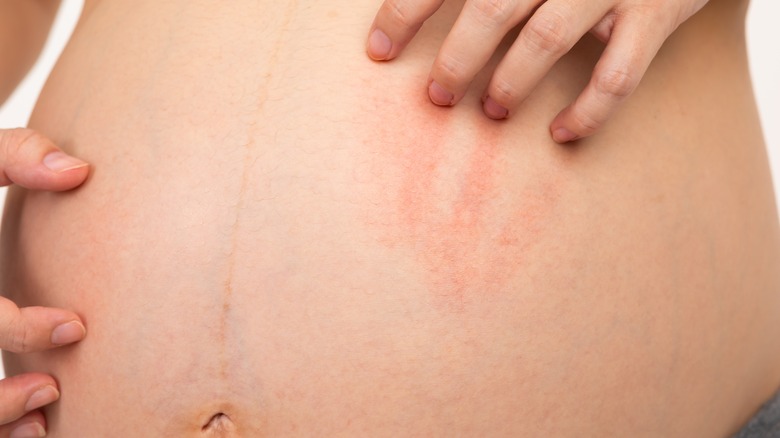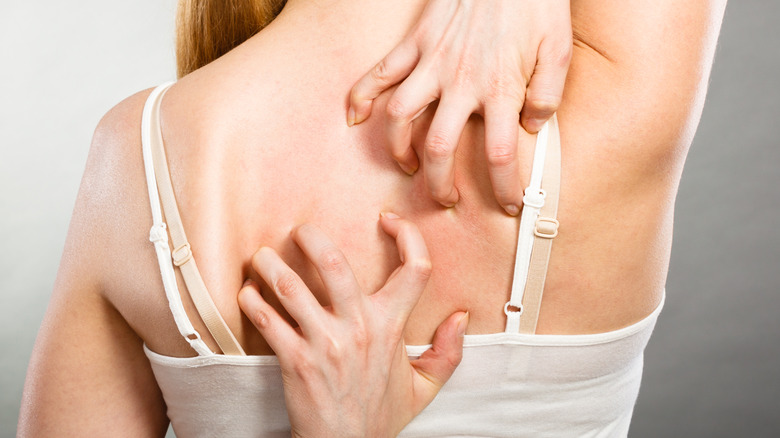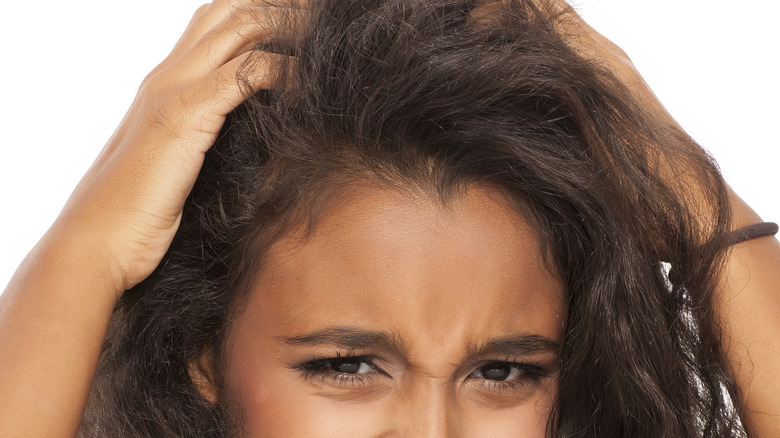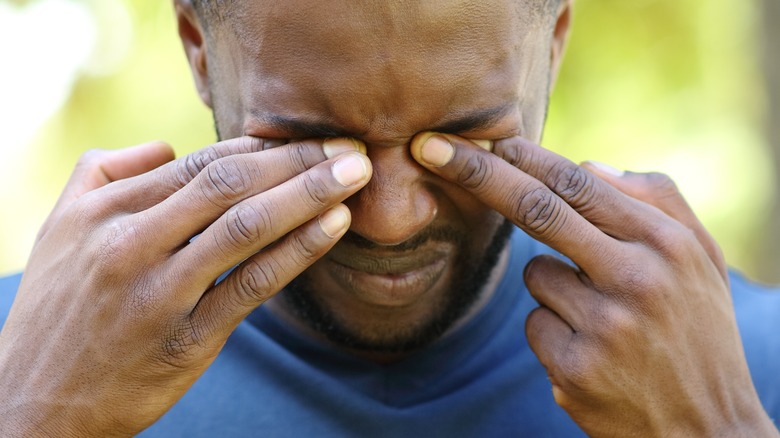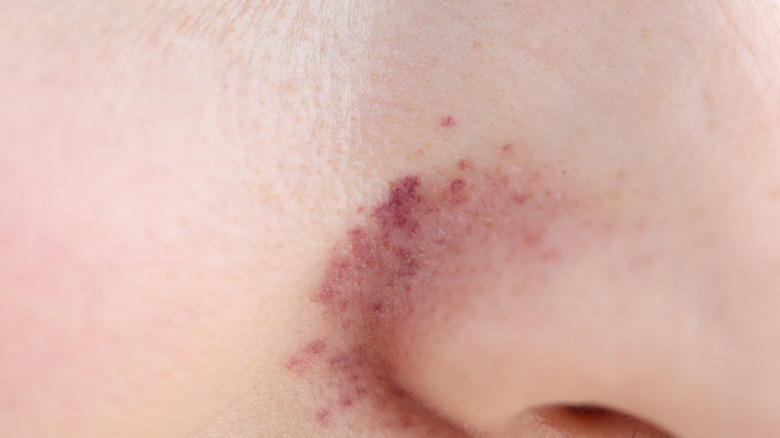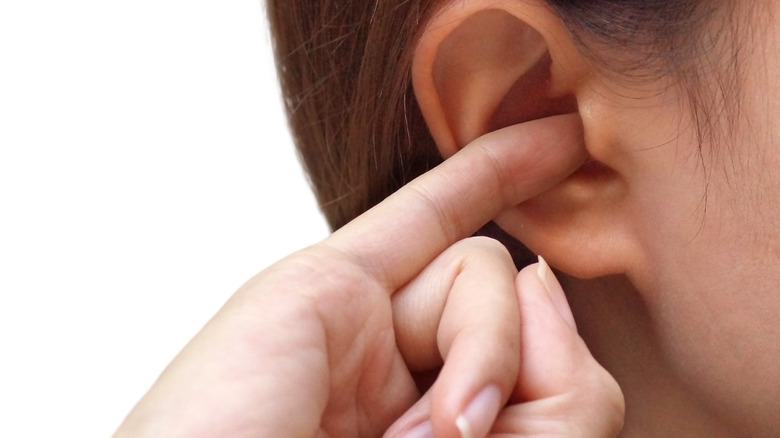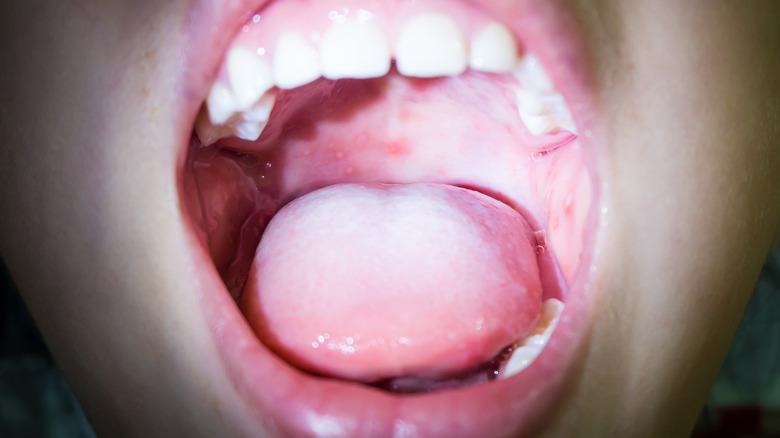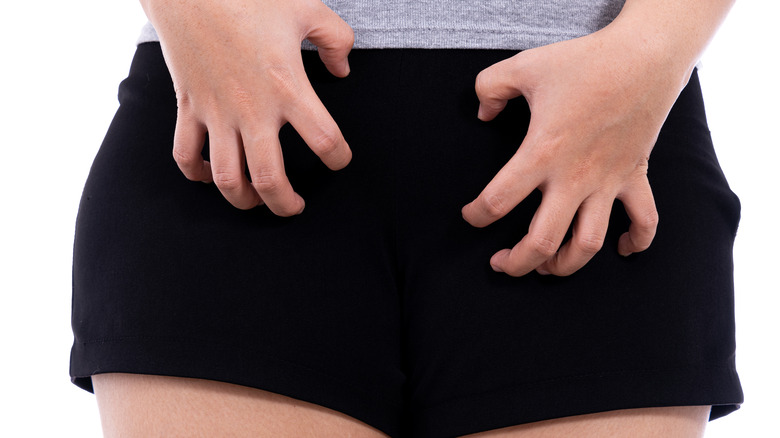Itches On Each Part Of Your Body Explained
As the experts at Pfizer explain, you have over 20 feet of skin designed to protect your internal structures from harm and invasion. One of the ways that skin does so is through itching. Itching occurs when the nerve receptors on your skin send signals to your brain indicating that immediate action is required to remove an invader, causing you to scratch.
However, scratching doesn't always get rid of the itch. Instead, it sometimes makes it worse because scratching causes pain. Pain distracts your brain from the itch and forces it to produce serotonin to block the hurt; unfortunately, blocking the pain makes the itch return (via Live Science). A recent European study published in Current Problems in Dermatology shows that over 50% of dermatological patients saw the doctor due to the cycle of itching, scratching, and pain. Furthermore, over 20% of the population suffers from chronic itch lasting over six weeks, according to the International Forum for the Study of Itch (IFSI).
Medically referred to as pruritus, diagnosing the cause of itching involves a comprehensive examination of your entire body, a detailed medical history, and, depending on where on the body you itch, consultation with additional specialists (via IFSI).
Hands
Superstition leads many to believe that itchy hands mean you will either get or lose a significant amount of money (via US Dermatology Partners). However, since people use their hands for almost everything, if this symptom continues, the latter belief may turn out to be true for you — as you may end up paying medical professionals to determine the medical reason for your discomfort.
Hand or dyshidrotic eczema affects around 10% of the population, per the National Eczema Association. This skin condition presents as small, itchy blisters on the palms of the hands, and is most commonly brought on by allergies or stress (via US Dermatology Partners). Allergic reaction, or contact dermatitis, causes itchy palms and hands after exposure to an irritant (via Medical News Today). Hand allergies present as rashes, hives, blisters, and dehydrated skin. You might also experience a burning or stinging sensation (via Healthline).
If you have diabetes, itchy hands could indicate that your blood sugar is too high. If left uncontrolled, diabetes can cause neuropathy and nerve damage that can present as itchy hands (per Medical News Today). And though it often presents as numbness and pain, carpal tunnel syndrome can also cause your hands to feel itchy, according to NetDoctor.
The best ways to try and prevent itchy hands are to drink plenty of water, use lotion, avoid irritating soaps, and wear gloves when handling chemicals (via Healthline).
Feet
The warm, moist environment created by wearing shoes for an extended period enables fungi to grow and infect the skin, especially if you have a cut or other skin opening. As a result, up to 15% of the population will get tinea pedis. More commonly referred to as athlete's foot, this infection usually occurs between your second to last and last toes and causes flaking, itching, redness, and cracking.
Another issue with wearing shoes all day is that socks usually accompany them. While the socks themselves may not be causing you to itch, what you wash them in could be. Allergic reactions and contact dermatitis could cause itchy feet (via HealthGrades). And while wearing shoes all day can lead to itchy feet, so can not wearing them. Unfortunately, many people often overlook their feet when applying sunscreen. The resulting burn often causes itching, per the experts at Feet By Pody. Additionally, like itchy hands, your feet can itch due to uncontrolled diabetes resulting in diabetic neuropathy. Insect bites are another itchy result of going without footwear (via Trident Health). Other medical issues that can cause itchy feet include chickenpox and Eczema (via HealthGrades).
Try and avoid itchy feet by washing your feet regularly and waiting for them to dry before applying cotton socks and shoes that allow for ventilation (via Healthline).
Arms
Allergies, dermatitis, and eczema cause your arm skin to itch like the rest of your body (via Healthline). Arm skin can also itch due to psoriasis, a disease of the autoimmune system that causes your skin cells to grow at a faster than average speed. The accumulation of skin cells causes red, scaly patches that are often itchy and painful (via the National Psoriasis Foundation).
Another condition that makes you want to scratch your arms is brachioradial pruritus. Named after the muscle in your lower arm that enables you to bend your elbow, this nerve disorder is linked to sun exposure and spinal problems (via the Cleveland Clinic). Light-skinned, middle-aged women are most at risk for brachioradial pruritus, and many find the condition wanes during the cooler months of the year (via the American Osteopathic College of Dermatology). Brachioradial pruritus most often affects those with a lengthy history of sunburn and those with cervical spine abnormalities, including cervical spine narrowing, neck trauma, herniated disks, osteoarthritis, and stenosis. However, most of those diagnosed with brachioradial pruritus don't report neck pain.
While you cannot prevent brachioradial pruritus or other causes of arm itching, you can lessen your chances of obtaining this annoying symptom by using methods that avoid sun exposure. It's also best to avoid substances you know can cause you to react, including harsh detergents (via the Cleveland Clinic).
Legs
While the skin on your legs is subject to the same ailments that cause itching as those that affect the skin on the rest of your body — including allergic reactions, eczema, and psoriasis — it is also vulnerable to itching from dry skin, stress, and shaving (via Medical News Today).
Dry skin, or xerosis, develops when your body loses too much water and oil. Symptoms include scaly, itchy, and red skin (via Mount Sinai). In times of extreme stress, some people develop itchy hives. Additionally, stress aggravates other skin conditions, including eczema and psoriasis (per Medical News Today). Shaving your legs can also lead to itchiness. Not only could you be allergic to the shaving cream, but you could also itch as a result of razor burn and razor bumps. Razor burn occurs when you irritate your skin by shaving (via Healthline). Razor bumps, on the other hand, are caused by shaved hair growing back and becoming ingrown. Another cause of itchy legs is folliculitis. According to the American Academy of Dermatology Association, folliculitis occurs when damaged hair follicles get infected. Folliculitis can result from shaving, tight clothes rubbing against your skin for an extended period, and spending time in a hot tub.
To lessen your chances of developing itchy legs, Healthline recommends avoiding harsh chemicals and soaps, using moisturizer daily, shaving with a sharp razor in the direction of your hair growth, and wearing loose fabrics.
Chest
While the skin on your chest is prone to the same causes of itching as the rest of your body, relatively few conditions cause itching to occur only on your chest (via Skinsight).
According to the Association for Professionals in Infection Control and Epidemiology, the itchy, blisterlike rash associated with the virus that causes chickenpox and Shingles often starts on the chest. Two fungi that like to cause you to scratch your chest are Tinea versicolor and dermatophytosis (or ringworm). Tinea versicolor is caused by an overgrowth of fungi that is naturally found on the skin and results in patches of discoloration and itching (via the Mayo Clinic). Meanwhile, the circular itchy rash associated with ringworm results from clothes that chafe, profuse sweating, sharing clothes and toiletries, close contact sports, and hot, humid weather (via the American Academy of Dermatology Association). Additionally, ten percent of those that breastfeed suffer from the pain and itchiness associated with a mastitis infection resulting from the baby not latching correctly or the patient not completely emptying the breast. Though it doesn't harm the infant, the mother might need medication to clear up the illness (via the American Academy of Family Physicians).
To avoid chest itching, refrain from using products known to cause irritation, see a breastfeeding specialist, wear loose-fitting clothing, don't share clothing or towels, and get your chicken pox and shingles vaccines (via Healthline).
Stomach
Itchiness that starts or stays around your midsection occurs for myriad reasons. However, the most prevalent cause seems to be related to pregnancy. Up to 40% of pregnant women report feeling itchy (via BioMed Research International). In addition, of those that reported needing to scratch, nearly 90% said their abdomen was the main culprit.
Cholestasis is one cause of being itchy during pregnancy (via the Mayo Clinic). As your pregnancy progresses, your hormones increase, and the bile that flows out of your liver decreases. As a result, bile builds up in your liver and then your bloodstream, and in some, it causes itchiness. Treatment depends on the severity of your case: Mild cases require the mom to take bile-reducing medication, while severe cases may require labor induction. Body expansion also causes some women to get stretch marks. These line-like images occur due to your skin growing faster than the cells contained within them. In addition, as Healthline explains, some pregnant women develop a hive-like rash on their stretchmarks called pruritic urticarial papules and plaques of pregnancy (PUPPP). This usually disappears within a week or two of delivery.
Fast weight gain in non-pregnant people can also cause stretchmarks and an itchy stomach (via Healthline). Scientists and medical professionals are studying the relationship between Irritable Bowel Syndrome (IBS) and pruritus. Connections have been found in mice and tested human tissue samples (via the American Society for Clinical Investigation). Shortening and cooling down showers (and applying moisturizer daily) may help prevent an itchy stomach.
Back
Back itches are incredibly frustrating, because you usually can't reach where you need to scratch. The most common cause of an itchy back is dry skin — and like other skin conditions that cause itching, it doesn't usually just affect your back (via SkinCare Physicians).
When the itch is constant and occurs under your shoulder blade, it could be the nerve disorder notalgia paresthetica (via Healthline). Notalgia paresthetica generally stays on one side of your back, and any changes in skin appearance are attributed to scratching and not the condition itself (via BioMed Central). Notalgia paresthetica is a type of sensory neuropathy believed to be caused by problems with the nerves in your spine, including entrapment, degenerative changes, and damage related to injury or illnesses, including shingles. Trapped nerves are considered primary to deterioration as causes.
Keeping your skin hydrated is the best way to avoid dry skin's itch on your back. To treat notalgia paresthetica, you can try several topical treatments, including capsaicin cream, steroids, and a lidocaine/prilocaine mixture. If symptoms persist, a medical professional may recommend acupuncture, spinal nerve block, or osteopathic manipulation (via the American Osteopathic College of Dermatology).
Head
Over one-quarter of those that sought medical treatment for scalp issues complained of itching as their primary symptom (via the National Center for Biotechnology Information). An itchy head is not only annoying, but it can also be embarrassing, and finding the cause could take time (via Medical News Today).
The most common reasons your head itches are seborrheic dermatitis and dandruff (via the Cleveland Clinic). The itching from seborrheic dermatitis occurs when the yeast that's normally on your scalp becomes overgrown. Meanwhile, itchy dandruff (which is considered a mild form of seborrheic dermatitis) results from the skin on your head being overly dry to the point that it flakes off (via Medical News Today). And then there's head lice: While the condition is most often associated with children under age 11, up to 12 million people scratch their heads yearly due to it, per the Centers for Disease Control and Prevention (CDC). These tiny bugs are spread mainly by close contact as they jump from person to person. Though they don't carry disease, these annoying itch creators could take up to six weeks to get rid of (via the CDC).
Prevention can be a bit challenging for some. Keep your head away from others, wear a hat to avoid sun damage, and rinse thoroughly after washing. Additionally, special shampoos, available over-the-counter and prescription, are often required to eliminate these head-scratching issues (via Scripps Health).
Eyes
Conjunctiva is the thin membrane that lines the inside of your eyelids. Conjunctivitis, or pink eye, occurs when this film becomes swollen. Inflammation results from allergies, dry eyes, and infections and causes your eyes to itch (via Mount Sinai). The most common types of conjunctivitis are viral and bacterial. Typically, the same virus that causes the common cold also causes viral conjunctivitis (via the American Academy of Ophthalmology or AAO). Bacterial conjunctivitis, on the other hand, comes from the same bacteria that gives you strep throat. While both are itchy, bacterial conjunctivitis is often accompanied by a sticky discharge. Both viral and bacterial conjunctivitis are highly contagious.
Every year, at least 20% of the population suffers from itchy eyes caused by eye allergies. Ocular allergies stem from the same culprits as nasal allergies, including pollen, dust, and mold. Almost all those who presented with eye allergies also had nasal allergies (via Harvard Health Publishing). In addition to allergies, dry eyes can also cause eye itching. Dry eye results from your eyes not producing enough tears to keep your eyes hydrated, and is often caused by medication or blocked tear ducts (per Healthline). You can simultaneously have eye allergies and dry eye (via Harvard Health Publishing), though neither are contagious (per AAO).
The best way to prevent conjunctivitis and the itchiness it causes is to keep your hands clean and away from your eyes. Also, refrain from sharing make-up and toiletries, and change your pillowcase often (via Mount Sinai).
Nose
When the inside of your nose itches, your body rids itself of the intruders by sneezing. However, the need to scratch can also occur outside your sniffer, and is usually accompanied by skin disease (via Humanitas Research Hospital).
According to Healthline, one such skin issue that makes the outside of your nose itch is rosacea. Primarily occurring on your cheeks and nose, this skin condition causes the skin on your face to turn red as if you're blushing. Some people with rosacea also get acne-like bumps. Other symptoms accompanying a rosacea outbreak include swelling, burning or stinging, and itchiness (via the National Rosacea Society). Medical professionals are unsure what causes over 16 million people to have rosacea (via the American Academy of Dermatology Association). However, common triggers include exposure to the sun, stressful situations, changes in the weather, alcohol consumption, and spicy food (per the National Rosacea Society). Rosacea is often mistaken for eczema, as both skin issues cause itchy, red skin and are brought on by environmental factors and extreme stress (via Healthline).
The best way to avoid an itchy nose caused by rosacea is to figure out what causes your flare-ups and avoid those triggers (via the National Rosacea Society).
Ears
If your ears itch, you may have only yourself to blame.
Each time you put something in your ears (e.g., a cotton swab), you risk injuring them. Your ear canal, and everything in it, is fragile — and even if you don't damage those structures by swabbing, you still risk opening the skin and inviting infection (via the NY Sinus Center). Your body makes ear wax to protect your ears from germs, and to move dirt and dead skin out of your ear. Ear wax, and the accompanying waste, dry up and fall out (via Medical News Today). Remove the ear wax, and two things can happen: First, you get rid of the protection your ears have from invasion, and then you push the ear wax back into the ear canal and cause it to build up and block your ear canal (via the Cleveland Clinic). Ear wax build-up is not only itchy on its own, but can also cause itchy ears through infection.
Other causes of ear infections that itch include germs associated with colds and the flu, as well as those associated with swimmer's ear (via Medical News Today). Allergies also cause itchy ears through nasal congestion that backs up into your ears, or through sensitivity to the metal in your earrings or the plastic on your hearing aids (via the Cleveland Clinic). According to Healthy Hearing, the best way to avoid itchy ears is to keep objects out and wash your hands before inserting hearing aids.
Mouth
Up to three-quarters of those with hay fever will experience an itchy mouth due to oral allergy syndrome (OAS) when eating raw fruits or vegetables (via the American Academy of Allergy, Asthma & Immunology). Mouth itchiness is a reaction to the pollen proteins in and on these foods. Cooking these items changes their makeup so that your immune system no longer recognizes or reacts to the allergen (via the American College of Allergy, Asthma & Immunology).
Another common cause of an itchy mouth is cold sores. Cold sores result from herpes simplex virus type 1 (HSV-1). Close to 90% of the population will be exposed to oral herpes by age 50, and close to 80% will be infected. Once you have HSV-1, you can't get rid of it. However, symptoms will come and go, and itchiness often occurs before cold sores develop (via John's Hopkins Medicine). Mouth itchiness also affects those with oral thrush, an overgrowth of a fungus naturally found in the mouth(via the Mayo Clinic). The increased production is usually attributed to a weakened immune system, uncontrolled diabetes, taking antibiotics or oral steroids, wearing dentures, using a pacifier, or dry mouth.
The best ways to avoid having an itchy mouth is to stay away from or cook fruits and vegetables you know will trigger a reaction. Also, don't have close contact with anyone with an active cold sore outbreak, and let your doctor know of any side effects of medications (via Healthline).
Entire body
Usually, due to dry skin, eczema, or psoriasis, close to 15% of the population suffer with itching that encompasses their entire body (via the Washington University School of Medicine).
According to the Cleveland Clinic, those with anemia are prone to entire body itching due to a rash known as petechiae. Medical professionals look to two causes of anemia rash: thinner skin that loses more water, and lower platelets, which help to form the red dots. Thyroid issues affect over 20 million people (via the American Thyroid Association); of those with hypothyroidism, many have a low amount of T4 hormones, resulting in dry, itchy skin all over the body.
Whole-body itching is a symptom of chronic kidney disease and liver disease (cholestasis). Cholestasis is a build-up of bilirubin or old, damaged red blood cells due to a blockage or stoppage of bile from the liver. Without the removal of these substances, itchiness occurs. Also, medications account for nearly 5% of all skin adverse reactions, including itching.
Some ways to avoid entire body itching include avoiding substances that trigger an allergic response, reducing stress, and getting enough rest. Using a humidifier and moisturizer daily also helps (via the Mayo Clinic). See your doctor if the condition becomes more than a nuisance and lasts more than a week or two. Seek immediate medical attention if you also experience trouble breathing or your lips, tongue, mouth, or face swells, as this could indicate anaphylaxis, a life-threatening allergic reaction.
Crotch
Over three-quarters of women will experience the intense crotch itch associated with a yeast infection. While everyone has the fungus known as Candida on their skin (especially in the mouth and genitals), it can become overgrown due to changes from pregnancy and taking the birth control pill and antibiotics. In addition, changes to your immune system and diabetes also make you more susceptible to yeast infections and their itch (via the Centers for Disease Control and Prevention).
As for men, a common cause of crotch itch is tinea cruris (jock itch). Like a yeast infection, this itch and its accompanying rash are caused by fungus (via the Mayo Clinic). Jock itch is most common in people who sweat more than usual, including athletes and those considered obese. Another possible cause of crotch itching is a sexually transmitted infection (STI). Three STIs that have genital itching as a symptom are genital herpes, trichomoniasis, and pubic lice or crabs (via City Walk-in Clinic).
To reduce your chances of having an itchy crotch, the Cleveland Clinic advises wearing loose clothing, changing your underwear daily, drying off immediately after bathing or swimming, and refraining from unprotected sex.
